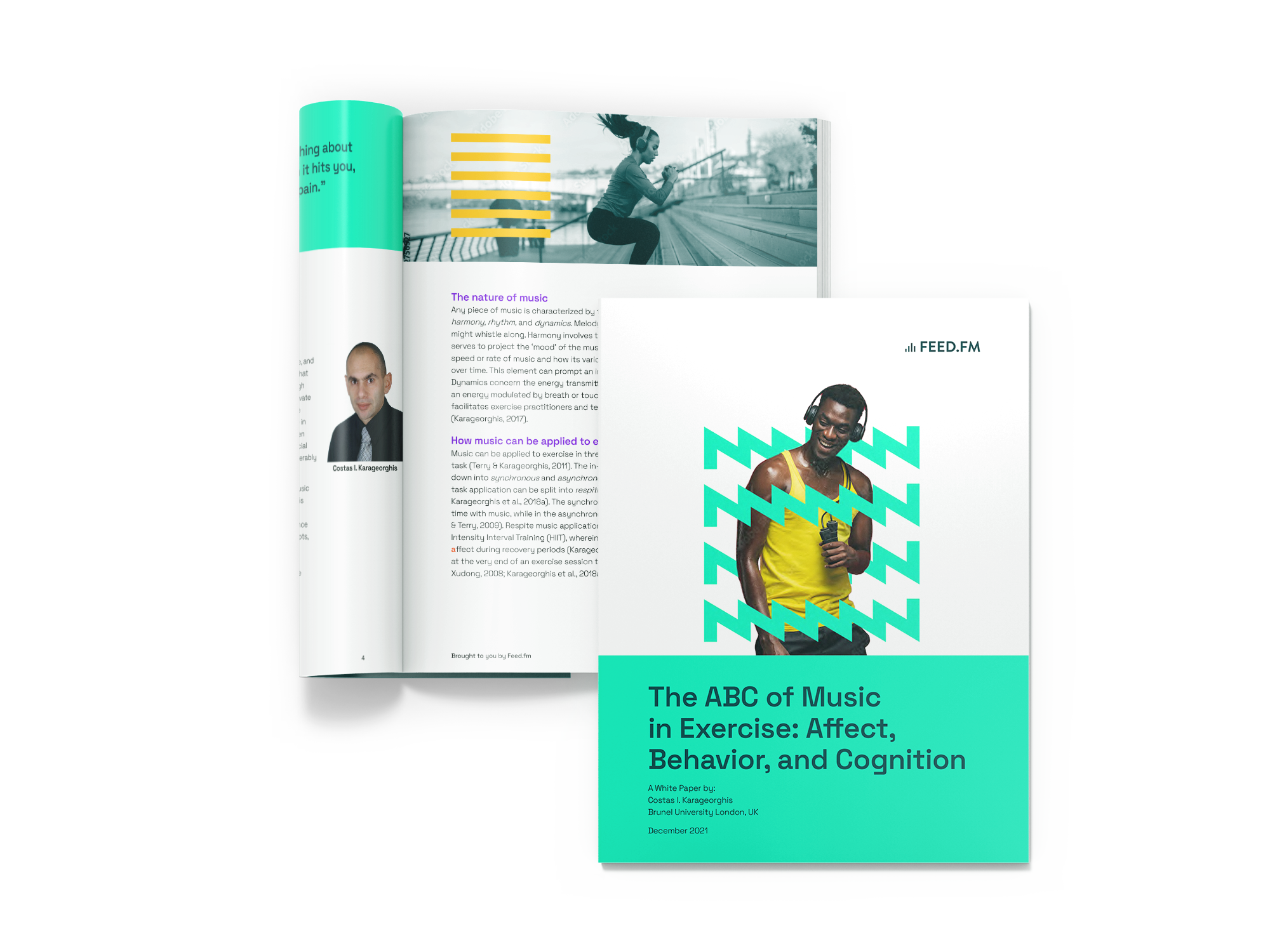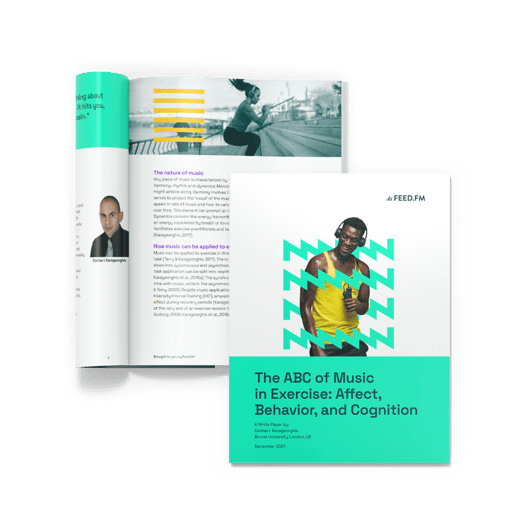New White Paper Validates Benefits of Music in Exercise

We believe deeply in the power of music to impact our lives in a variety of meaningful ways. So much so, in fact, that it’s the foundation of Feed Media Group (FMG) and everything we’re building. While we intuitively know that music matters in exercise, as curators of exercise soundtracks for some of the world’s leading fitness brands, we are always working to better understand WHY.
As we continue to deliver custom music at scale for companies including Mirror, Tonal and Alo Moves, it’s vital to understand what is happening in our brains and bodies when listening to music while exercising. We were thrilled to connect with Professor Costas Karageorghis, PhD, CPsychol, CSci, FBASES, AFBPsS, and Sport & Exercise Psychology professor at Brunel University London, to discuss his groundbreaking music and exercise research, which spans more than two decades.
We teamed up with Professor Karageorghis because there is so much synergy with his specialized expertise and our work as the leading music solution for digital fitness brands. The result is a new white paper, titled “The ABC of Music in Exercise: Affect, Behavior, and Cognition,” in which Professor Karageorghis compiles a treasure trove of scientific data reinforcing that music influences exercise in a number of significant ways. Namely, the paper validates that music has the ability to alter mood, rewire brains, and improve our fitness outcomes.
.png?width=529&name=abc%20exercise%20music%20graphic%201%20(1).png)
A growing body of evidence demonstrates that the right music at the right time arouses an exerciser before a workout, distracts from fatigue while boosting efficiency during exercise, and improves mood after a workout. Professor Karageorghis frames his findings around three main categories, which he refers to as the “golden thread” that ties the evidence together:
- Affect (underlying emotion) - “Music can temper the shift toward negative affect, such as displeasure, that is usually unavoidable during intense forms of exercise.” As an “aesthetic stimulus” that promotes pleasure, music has also been shown to reduce feelings of fatigue. Music thus delivers a more enjoyable and more efficient workout. According to Professor Karageorghis, people can be distracted by music to sustain exercise intensities at which they are likely to accrue significant health benefits (e.g. reduced risk of coronary heart disease).
- Behavioral (exercise performance) - Humans have an innate predisposition to synchronize movement with the rhythmical qualities of music. The use of synchronous music can reduce the metabolic cost of exercise and has been found to have an “ergogenic” or work-enhancing effect. This effect has been demonstrated particularly in track and treadmill running and circuit-type exercise. Among people who are recreationally active, the ergogenic effect can be as great as 15%. Based on these findings, Professor Karageorghis asserts that music might even be considered a “legal, performance-enhancing drug,” albeit one without undesirable side-effects.
- Cognitive (thought processes) - That’s right, music can actually change your mind. “Pre-task” music has been found to elicit exercise-related cognitions or thought processes that feed into mental preparation. For example, these cognitions might be exercise-related imagery or positive self-talk prompted by lyrical excerpts (e.g. lyrics like “I feel good”, “let’s get physical”, or “moving on up”). Professor Karageorghis says that it’s best to prioritize music with lyrics that provide affirmation, empowerment, and motivation, noting that “full advantage should be taken of lyrical content.”
So what does all this mean? Incorporating the right music into a digital fitness experience has a demonstrable net positive impact for exercisers, which also positively impacts the business. With so much hard evidence proving the beneficial effects of music in fitness, the real question becomes - how do you actually create the perfect soundtrack?
Context is the key to effectiveness when it comes to music curation, and fitness is no exception. “A primary consideration is that music selected to accompany exercise should be congruent with exercisers’ personal preferences—incorporating age-related factors and socio-cultural background—and meet the demands of the intended exercise task,“ Professor Karageorghis writes.
The just-released white paper “The ABC of Music in Exercise” goes into much greater depth with actionable tips for fitness companies.
These insights about the power of music in fitness couldn’t come at a better time. “The pandemic has severely impacted people’s patterns of physical activity in the Western world, and digital music-based solutions provide a means by which to make exercise a habitual activity and for it to be rendered more enjoyable,” Professor Karageorghis notes. “As the global community strives to recover from the pandemic and re-establish positive physical activity habits, it is clear that the exercise–digital music nexus holds considerable value.”
FMG has been leveraging Professor Karageorghis’ formative research for years, and we’re proud to be partners in the dissemination of his important findings.
We invite you to download the white paper today!



 3 min
3 min